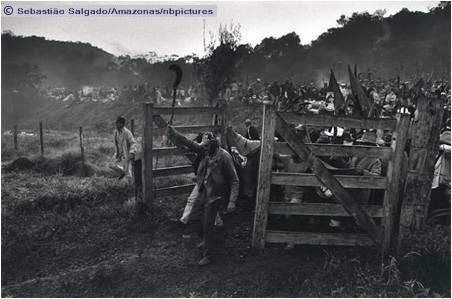With large land occupations, the MST demands Agrarian Reform
The immediate settlement of 90,000rncamped families is on the agenda of the National Day of Struggle
 Cutting the Wire - Sebastião Salgado
Cutting the Wire - Sebastião SalgadoWith occupations of large estates in all regions of the country, the Landless Workers' Movement (MST) demands the implementation of land reform, demand for more than 90,000 families now camped in large estates or the roadside. On the morning of Tuesday August 2, 2016), 700 families occupied the lands of Usina Lambari in Jau-SP, owned by Atalla Group.
The group leased the property to another large conglomerate (Raizen, a result of the merger of Shell and Cosan businesses), laying off more than 3,000 workers in São Paulo without paying their labor rights. Now the land is occupied by landless families who demand the land to produce their livelihoods and the conditions for healthy eating in the countryside and cities.
Another great latifundia occupied during the National Day of Struggle against the coup and for agrarian reform was the Usina Santa Helena, linked to the Naoum Group, large debtor of the Union. The action with over a thousand families took place on Sunday (July 31, 2016) in the city Santa Helena de Goiás-GO in response to the attempt to criminalize the movement orchestrated by the judiciary, police and the prosecutor.
"The MST already accounts for two political prisoners militants in Goiás, in the absurd attempt to frame the movement as a criminal organization. This has never happened in our 32 years of struggle for Landless families accessing their right to have a land to plant, produce and live their lives," says Marina dos Santos of the MST national coordination.
"The journey of struggle is for Agrarian Reform People and against the coup, to denounce how agribusiness treats the land and denounce dodgers of business taxes and duties, misappropriating millions from the population as in the case of plants of the Naoum Group in Goiás, and Atalla, in São Paulo, occupied in recent days,” she explains.
"We fight against the scrapping of the National Institute of Colonization and Agrarian Reform (Incra), the extinction of the Ministry of Agrarian Development (MDA) and against this illegitimate and putschist government of Temer. We demand the immediate settlement of the encamped families and the end of the criminalization of movements and social struggles,” Marina exclaimed.
"This ideological persecution situation only encourages further workers to organize themselves to fight for our rights. We want land to be a new model of agricultural production in agroecological transition to healthy food for the tables of families in the cities," concludes the militant. Since March 24, actions unfold in protest across the country.
Check out the mobilizations in other states:
Pará
About 100 landless occupied the headquarters of INCRA, in Marabá, Southeast Para the night of July 25. One of the main demands of the workers was the creation of new rural settlements to serve about five thousand landless living in camps in the South and Southeast of the state.
Sergipe
About 15,000 landless workers marched in Aracaju, in celebration of the Day of the Rural Worker and in defense of democracy. Among the movement's demands was the expropriation of farms, the implementation of a water supply system, credit for setting and maintenance of technical assistance services.
Cuiabá
In Cuiabá, about 100 landless workers occupied the INCRA headquarters. Among the listed claims are the right to food security and sovereignty, without pesticides or GMOs, education and quality health care for all and a true agrarian reform and effective.
Dê Silva, regional coordinator of the MST, said the aim of the occupation is to press the Institute for establishment of settlements and infrastructure that is more adequate than existing ones. Among the demands of the movement, is the immediate settlement of about 2,000 families camped in the state.
"In Mato Grosso it never happened agrarian reform indeed. In fact, they consolidated settlements in rural slums, without proper infrastructure or livelihood opportunities, access to credit, health and other basic needs. Therefore, our struggle remains firm and strong, to enforce our rights and those of all the Brazilian working class," said Dê.
São Paulo
The Landless also participated in a unitary act of the popular movements of the field in front of the Federal Public Ministry of Bauru on July 27.
Paraíba
600 landless rural workers occupied the INCRA headquarters in João Pessoa. Workers demand a return of settlement construction throughout the region of the state.
Fortaleza
About 1000 workers and landless workers occupied the headquarters of INCRA in Fortaleza.
The agenda, now old, is known to the state governments: land for more than four thousand families in encampments. The workers also denounced the constant threat of eviction families suffer constantly. Workers also occupied the headquarters of the State Environmental Superintendency (Semace).
Mato Grosso do Sul
Landless occupied the main highways of Mato Grosso do Sul. BR 060 was blocked in Sidrolândia BR 267em Casa Verde, BR 163 in Naviraí and Rio Brilhante and BR 262 in Terenos and Três Lagoas. The Landless also occupied the Institute of Land of Mato Grosso (Intermat).
Maranhão
The MST held between July 28 and 30,, the State Fair of Agrarian Reform in São Luís. A little over a ton in agroecological food, and craft productions of farmers from all over the state of Maranhão were sold, bringing the field population the city.
Paraná
In Paraná, for four days of activities, nearly three thousand farmers, students, researchers, among others, attended the 15th Day of Agroecology. The Journey also is configured as a socializing space of the rural peoples' needs and thus reaffirms its historic demands, guaranteeing the right to land and territory of indigenous peoples, quilombolas, farmers and people from traditional communities, as the first condition for progress agroecological popular and sovereign project for agriculture.
